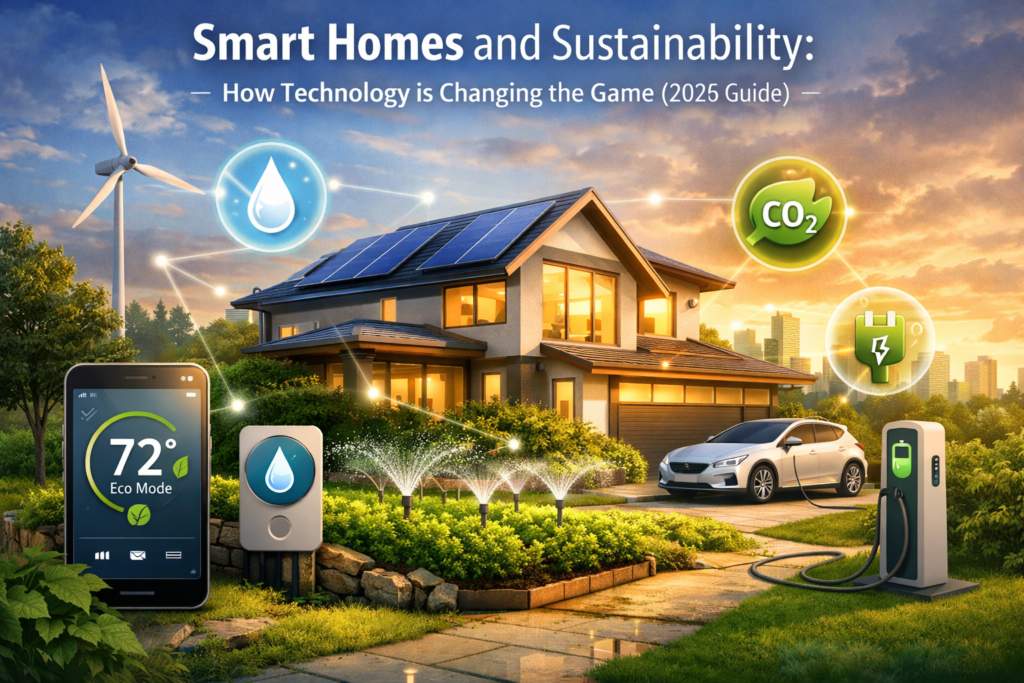Smart Homes and Sustainability: How Technology is Changing the Game
Published on February 1, 2026 by Dr. Ahmad Mahmood

For years, the “Smart Home” was sold to us as a luxury—a way to turn on the lights without getting off the couch or to play music with a voice command. But in 2026, the narrative has shifted.
Smart home technology is no longer just about convenience; it is about survival.
As we face rising energy costs and urgent climate goals, home automation has emerged as a powerful tool for sustainability. From AI-driven thermostats that predict the weather to leak detectors that prevent water bankruptcy, technology is reshaping how we consume resources.
Here is how smart homes are changing the game for a greener future.
The Shift from “Connected” to “Conscious”
A decade ago, a “connected” home meant devices that talked to your phone. Today, a “conscious” home talks to the grid.
Modern smart homes utilize the Internet of Things (IoT) not just to obey commands, but to make decisions. They optimize energy use based on real-time data, cutting waste that humans often miss.
- Stat to Know: According to recent data, smart home technology can reduce a household’s energy consumption by up to 30-40%, significantly lowering its carbon footprint.
1. Energy Efficiency: The Low-Hanging Fruit
The biggest impact of smart tech is on your electricity bill.
The AI Thermostat Revolution
Heating and cooling account for nearly half of the average home’s energy use. Traditional thermostats are dumb; they heat an empty house just because you forgot to turn the dial.
- How it works: Smart thermostats (like Ecobee or Nest) use geofencing to know when you leave. They automatically enter “Eco Mode,” ensuring you never heat or cool an empty space.
- The Upgrade: New AI models now integrate with local weather forecasts. If a heatwave is coming, they pre-cool the home during off-peak hours when energy is cleaner and cheaper.
Smart Lighting and “Vampire Power”
Leaving lights on is a classic energy waster, but “Vampire Power” (standby power) is the silent killer.
- Smart Plugs: These devices cut power to electronics completely when they aren’t in use, stopping devices like TVs or gaming consoles from draining energy in standby mode.
- Automated Lighting: Motion sensors ensure lights are active only when a human is present.
2. Water Conservation: Stopping the Drip
With global water scarcity becoming a reality (see our report on Global Water Bankruptcy), every drop counts.
- Smart Irrigation: Old sprinklers water the lawn even during a rainstorm. Smart irrigation controllers check local weather data and soil moisture sensors, skipping watering cycles if the ground is already wet. This can save up to 50% of outdoor water use.
- Leak Detectors: A microscopic leak can waste thousands of gallons a year. Smart water monitors (like Phyn or Flume) track flow rates 24/7. If they detect a burst pipe or a running toilet, they send an alert and can even automatically shut off the main water valve to prevent disaster.
3. The Rise of the “Prosumer” (Producing + Consuming)
The ultimate sustainable smart home doesn’t just save energy; it makes it.
We are seeing the rise of Virtual Power Plants (VPPs). Homes equipped with solar panels and smart batteries (like the Tesla Powerwall) can now talk to the city grid.
- The Game Changer: During peak usage times (like a hot summer afternoon), your smart home can sell excess stored energy back to the grid. This stabilizes the network and prevents utility companies from turning on dirty coal “peaker plants.”
The Dark Side: The Challenge of E-Waste
We cannot talk about technology without addressing the elephant in the room: Electronic Waste.
While smart devices save resources during their life, they become toxic waste at their death. The rapid cycle of upgrading to the “newest” gadget contributes to the global e-waste crisis.
- The Sustainable Solution: To truly be green, we must choose devices with long software support lifecycles (Matter-compliant devices) and prioritize repairability over replacement. A smart home isn’t sustainable if you have to replace every bulb and sensor every two years.
Future Trends: What to Expect in 2026 and Beyond
- Matter Protocol: The new universal language for smart devices. It allows different brands to work together, reducing the need for multiple hubs and gadgets (less hardware = less waste).
- Energy-Harvesting Sensors: We are beginning to see sensors that don’t need batteries. They run on ambient light or radio waves, eliminating the need to dispose of millions of AA batteries.
Conclusion: A Home That Cares
Technology is often blamed for disconnecting us from nature, but in the home, it might be the very thing that saves it. By automating conservation, smart homes remove the “human error” from sustainability. They make being green the default setting, not a daily chore.